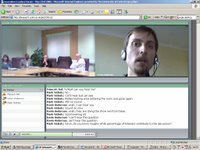 Someone had to ask it. The where’s-the-money question, that is.
Someone had to ask it. The where’s-the-money question, that is.
If you missed last night’s Journalism Leaders Forum roundtable on “news as conversation” with Kevin Anderson, the BBC’s 2004 US election blogger who is now on the "World Have Your Say" programme team, it went like this:
Jethro Goko: "I’m glad, Kevin, that you don’t necessarily see a bleak future for print because of blogging. But I do worry about blogging. I can not see a business model for blogging. For me, as long there is no business model and somebody can not make real money, the future looks bleak [for blogging]."
Kevin Anderson: "Well, I think there is two issues and if you are talking strictly about people blogging, there are companies quite happily making money with blog hosting companies. If you are talking about why should you, as a mainstream media outlet, blog. I can give you quite a few compelling reasons...
What I say (and I say this a lot at the BBC) blogs are public interface for a public broadcaster. There is a famous blogger, Robert Scoble, who blogs for Microsoft. And obviously he’s part of their developer network and he says blogging keeps him close to his customer.
For us, blogging keeps us close to our audience. It makes sure that we’re not just off on our own agenda. And I think that is something that we should take on board. That some times there are things our audience wants to hear or talk about, things that aren’t necessarily part of our agenda.
The other thing - and quite honestly it is something that I had an opportunity to do two years ago [when I blogged the 2004 US presidential elections for the BBC] and I haven’t had the opportunity to do, and something I would give my leg for the opportunity to do it-... Blogging is an incredibly powerful news tool.
I can do things, breaking news wise with a blog that I would never be able to do with a newspaper, that I would never be able to do with a radio, that I would never be able to do with television. It’s a missed opportunity. And it enriches our journalism. It returns a responsiveness, it returns a rawness, an immediacy that I think is really somehow missing in our journalism. It is a huge opportunity that is not being met. I think in some ways it’s because a lot of people in the mainstream media don’t understand what blogging actually is or what it represents.
They see it as another opportunity to publish their content. They don’t see it as a way to have a conversation with their audience. Or as a very lightweight powerful tool to publish content from the field and to also take questions from your audience.
Just think if I was on the scene of a breaking story able to publish updates minute by minute that could be pushed out to a network of people who had SMS alerts set up and then they could send me a question and ask me questions directly in the field. That is a powerful relationship with your audience that will make money, that will keep your brand relevant. It is something the mainstream media is not doing. And, quite frankly, it’s a failure on our part."
You can view an unedited recording of the lively discussion here.
Mark your diary, the next forum is scheduled for the week of October 16th. If you want to receive an invitation or e-mail alert, send a note to leadersatukjournalism.org.
We’re still accepting applications to the Principles of Journalism Leadership module this autumn. Check out the participant reviews here - and if you want to join in, you'll find out how on our website.

